I do. Maybe if you paid more attention you would learn something. The thesis by our youtuber and folks promoting the same idea is that reflections are bad. That they need to be stomped out. To that end, any research that points to no negative effect completely invalidates that assumption. And such was what you quoted. Indeed, that is the nature of the research. Reflections are either harmless or beneficial. Since not treating reflections saves you money and avoids making your room an ugly site, it is a win all around.Do you actually read before you post
-
WANTED: Happy members who like to discuss audio and other topics related to our interest. Desire to learn and share knowledge of science required. There are many reviews of audio hardware and expert members to help answer your questions. Click here to have your audio equipment measured for free!
You are using an out of date browser. It may not display this or other websites correctly.
You should upgrade or use an alternative browser.
You should upgrade or use an alternative browser.
How NOT to set up speakers and room treatment ( Goldensound)
- Thread starter Nkam
- Start date
- Status
- Not open for further replies.
I said what the poster was observing regarding speech intelligibility being better outside is puzzling. Not what I was saying.I'm missing something. How can what you describe be puzzling?
I do. Maybe if you paid more attention you would learn something. The thesis by our youtuber and folks promoting the same idea is that reflections are bad. That they need to be stomped out. To that end, any research that points to no negative effect completely invalidates that assumption. And such was what you quoted. Indeed, that is the nature of the research. Reflections are either harmless or beneficial. Since not treating reflections saves you money and avoids making your room an ugly site, it is a win all around.
Not exactly, absence of reflections per your passage from Augsperger, gave the result that "locations of individual sound sources were more precise, that the timbre of individual instruments were more natural, and that the overall stereo picture was more tightly focused." So, reflections degraded these things. His final preference (for untreated walls) was just that, a preference. Ours too.
And "they need to be stomped out"? That's intense. Are you sure they said that?
Let's bring some evidence from another angle to show why room reflections can be beneficial. Hopefully most of you know that we don't like resonances in speakers (peaks in some frequencies). But when it comes to the music itself, resonances are heart and sole of many instruments. In that regard, the more we hear them, the more enjoyable they are going to be. Research shows, counterintuitively, that reflections in room accentuate our ability to hear resonances. From famous Dr. Toole/Olive paper,
The Modification of Timbre by Resonances: Perception and Measurement*
FLOYD E. TOOLE AND SEAN E. OLIVE
National Research Council, Division of Physics, Ottawa, Ont. K1A OR6, Canada
A study was put together where a Q-1 resonances at 1 kHz was tested for audibility. Lower Q resonances like this are the most audible kind. An impulsive tone was used to detect minimum threshold of audibility. The impulse was then repeated at different rates. Here were the results with headphones, anechoic chamber and a reverberant room with RT-60 of 2 seconds (quite long/reflective):

Notice how the threshold of hearing for reverberant room was far lower than either headphones/anechoic chamber which were similar to each other. Listeners could detect the resonance at some 10 dB lower in the high reverberant room. In another test, RT60 was varied to see the effect on this threshold:

Remarkably, we are able to detect resonances at lower level at RT60 of 1 second (-14 dB) than at 0.3 second (9 dB). But both were superior to no reflections.
The last line is a sobering thought: that people creating music should allow reflections in their rooms as to better hear these resonances.
Many people have preference for speakers in rooms. This is one of the reasons for such preference over headphone listening, or the perfect non-reflective room (anechoic chamber).
The Modification of Timbre by Resonances: Perception and Measurement*
FLOYD E. TOOLE AND SEAN E. OLIVE
National Research Council, Division of Physics, Ottawa, Ont. K1A OR6, Canada
A study was put together where a Q-1 resonances at 1 kHz was tested for audibility. Lower Q resonances like this are the most audible kind. An impulsive tone was used to detect minimum threshold of audibility. The impulse was then repeated at different rates. Here were the results with headphones, anechoic chamber and a reverberant room with RT-60 of 2 seconds (quite long/reflective):
Notice how the threshold of hearing for reverberant room was far lower than either headphones/anechoic chamber which were similar to each other. Listeners could detect the resonance at some 10 dB lower in the high reverberant room. In another test, RT60 was varied to see the effect on this threshold:
Remarkably, we are able to detect resonances at lower level at RT60 of 1 second (-14 dB) than at 0.3 second (9 dB). But both were superior to no reflections.
The last line is a sobering thought: that people creating music should allow reflections in their rooms as to better hear these resonances.
Many people have preference for speakers in rooms. This is one of the reasons for such preference over headphone listening, or the perfect non-reflective room (anechoic chamber).
It has nothing to do with the ear/brain processing. It is what HRTF is about.I keep suggesting folks listen to their speaker(s) through closed back headphones that block out the room, fed by a measurement (flat) microphone.
Gives a clue to the extent of the ear/brain processing going on. Almost shocking ime.
If you want know how to do it right, see Dr David Griesinger's method. Attached a few screenshots from his presentation.
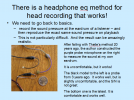
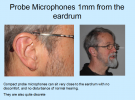
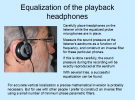
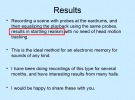
You can have your preference but you better test it in controlled environment like Augsperger did. Instead, I find that many of you are chasing lay ideas and convincing yourself you must be right.Not exactly, absence of reflections per your passage from Augsperger, gave the result that "locations of individual sound sources were more precise, that the timbre of individual instruments were more natural, and that the overall stereo picture was more tightly focused." So, reflections degraded these things. His final preference (for untreated walls) was just that, a preference. Ours too.
You can have your preference but you better test it in controlled environment like Augsperger did. Instead, I find that many of you are chasing lay ideas and convincing yourself you must be right.
No, we don't need to "test" to have listener preference. We just listen. As you know there's no harm in that as long as we don't extrapolate toward declaration of universal/empirical conclusions. The contribution of various reflections is complex, improving some aspects and degrading others depending on specifics. Music type and listening purpose are factors. There's no need for scolding (from either end of the preference range).
boxerfan88
Senior Member
- Joined
- Oct 23, 2018
- Messages
- 400
- Likes
- 439
Along these lines, have you noticed how your loved one's voices don't change as you listen to them in different rooms in your home? Reflections are changing but adaptation makes sure that we mostly hear the direct sound.
What you've said is true, our loved one's voices sound the "same" even in different rooms.
This means that our ear-brain will adapt to both treated and untreated rooms.
Therefore, the decision to treat or not treat a stereo HiFi room boils down to personal preferences, I suppose...
It has nothing to do with the ear/brain processing. It is what HRTF is about.
If you want know how to do it right, see Dr David Griesinger's method. Attached a few screenshots from his presentation.
View attachment 290290 View attachment 290291 View attachment 290292 View attachment 290293
HRTF is significant, but I think @gnarly was also referring to how we adjust to the specific acoustics of a room.
Yes you do if you are going to jump in an argument and keep posting as if this is wild west and any preference will do. We don't accept that in speaker sound and are not going to do it here when there is strong evidence of preference for reflective rooms. Really, your pleading posts are getting tiring. If you have some research to add to the topic, do. Otherwise I will be giving you a reply ban.No, we don't need to "test" to have listener preference.
Oh very cool thank you.It has nothing to do with the ear/brain processing. It is what HRTF is about.
If you want know how to do it right, see Dr David Griesinger's method. Attached a few screenshots from his presentation.
View attachment 290290 View attachment 290291 View attachment 290292 View attachment 290293
But it looks to me HRTF is what the ear/brain processing is doing..
Looks to me it's about creating an inversion of the ear mics capture, as shown per snip below.
Seems to me that inverse frequency response leveling reflects it what takes to make things sound right, .....no?
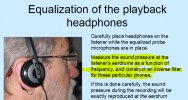
Last edited:
Yes you do if you are going to jump in an argument and keep posting as if this is wild west and any preference will do. We don't accept that in speaker sound and are not going to do it here when there is strong evidence of preference for reflective rooms. Really, your pleading posts are getting tiring. If you have some research to add to the topic, do. Otherwise I will be giving you a reply ban.
I've said that a preference within the EBU standard range is likely valid, no wild west. But I'll stop responding to your posts here.
I was the poster. So I'm now lost as can be....I said what the poster was observing regarding speech intelligibility being better outside is puzzling. Not what I was saying.
You seemed to be giving a reason for why outside being clearer than indoors can't make sense.. due to declining SPL vs distance ( a reason that makes no sense)
?????????
theREALdotnet
Major Contributor
- Joined
- Mar 11, 2022
- Messages
- 1,202
- Likes
- 2,076
And by “we” you mean four people.Remarkably, we are able to detect resonances at lower level at RT60 of 1 second (-14 dB) than at 0.3 second (9 dB). But both were superior to no reflections.
Do you have any research showing the correlation between early reflections and the collapse of the stereo sound stage (front to back)? Now, that would be interesting, and relevant to the discussion.
The thread has attracted a few detractors and they have been quite vocal. That doesn't make this any kind of reasonable sampling. I have shown proper research that even among people mixing music, reflections were preferred by largest percentage. And that is among the group that people think universally prefer deader spaces. Further, as I commented earlier, it is difficult to simulate the right effect because you have to be careful to not change the overall amount of reverberation when you add or remove side panels. Study I just mentioned controlled for this. And studies done in anechoic chamber are immune to it.
Take this informal study by AUGSPURGER in his AES paper, LOUDSPEAKERS IN CONTROL ROOMS AND LIVING ROOMS
View attachment 290282
As I said, the evidence to support this point of view is far and wide.
Doesn't it say right there there was a significant minority with the opposite preference? And that it's a tradeoff?
Shouldn't this be presented as "Do X for more spacious envelopment", "Do Y for more precise imaging", and "If you're not sure what you want, most people perfer the spacious envelopment"?
theREALdotnet
Major Contributor
- Joined
- Mar 11, 2022
- Messages
- 1,202
- Likes
- 2,076
The thesis by our youtuber and folks promoting the same idea is that reflections are bad. That they need to be stomped out.
I wish you would let go of that trope. Treating early reflections in a room does not “stomp out reflections”. It won’t even eliminate early refections, just attenuate them. Look at ETC curves of acoustically treated rooms to see what I mean.
bo_knows
Addicted to Fun and Learning
Revel Owner's Manual has a section on acoustic treatment and they provide specific directions on where to place them.

To be fair, this was also included.

To be fair, this was also included.
Last edited:
theREALdotnet
Major Contributor
- Joined
- Mar 11, 2022
- Messages
- 1,202
- Likes
- 2,076
Revel Owner's Manual has a section on acoustic treatment and they provide specific directions on where to place them.
They must be unfamiliar with Toole’s research.
thecheapseats
Addicted to Fun and Learning
George's recording spaces and listening rooms are legendary and those that have survived are still in use today... the mods done to his control room designs in later years (mid 80s and beyond) long after they were constructed kept them current as well - even when his monitors were replaced with other speaker designs...Take this informal study by AUGSPURGER in his AES paper, LOUDSPEAKERS IN CONTROL ROOMS AND LIVING ROOMS
So, I had the opportunity to listen to some references on decent speakers in a room with pretty "live" side wall reflections and diffused rear wall today. Stuff I know has a very strong center image in a good room.
In short... Bad. Phantom center got totally muddled and fell apart, everything felt like there was a cheap stereo widening effect like you find on PC sound card drivers.
Absolutely not acceptable for a recording studio control room. I see how you might like it if you're really into a false sense of spaciousness and you're just listening for pleasure, but listening for work with that? Woof, absolutely not.
In short... Bad. Phantom center got totally muddled and fell apart, everything felt like there was a cheap stereo widening effect like you find on PC sound card drivers.
Absolutely not acceptable for a recording studio control room. I see how you might like it if you're really into a false sense of spaciousness and you're just listening for pleasure, but listening for work with that? Woof, absolutely not.
- Status
- Not open for further replies.
Similar threads
- Poll
- Replies
- 362
- Views
- 50K
- Replies
- 34
- Views
- 3K
- Replies
- 383
- Views
- 35K
- Replies
- 7
- Views
- 2K
